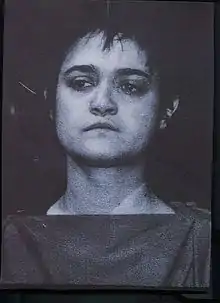Angelique Rockas
Angelique Rockas (born in Boksburg, South Africa) is an actress, producer and activist. Rockas founded Internationalist Theatre in the UK with patron Athol Fugard. The theater featured multi-racial casts in classical plays, breaking racial barriers that were once accepted norms for theatrical performances.
Angelique Rockas | |
|---|---|
 Angelique Rockas in the role of Medea | |
| Education | University of the Witwatersrand, University of Cape Town |
| Occupation | Actress: stage and film, theatre practitioner and founder of Internationalist Theatre |
| Years active | 1978–present |

Early life
Rockas was born and raised in Boksburg, South Africa to Greek parents who had emigrated from Greece with hopes of finding a better life. She had three siblings, followed Orthodox Christian traditions, and was taught to honor her Greek cultural heritage.[1] She received her early education at St Dominic's Catholic School for Girls, Boksburg,[2] and later earned a BA honours degree in English literature with a major in philosophy at the University of the Witwatersrand. After earning her degree, Rockas went on to complete an acting course at the Drama School of the University of Cape Town under the direction of Robert Mohr.[3][4]
A young activist, Rockas appeared on the June 1970 front page of the Star with a group of debutantes raising funds for Saheti School, a Greek school located in Germiston, South Africa.[5] She also participated in a 25 March Greek War of Independence Poetry Celebration with George Bizos.[6] Bizos nicknamed her “l’enfant terrible” for her resistance to the status quo,[7] and became her role model leading up to her founding of the Internationalist Theatre.[8]
Her activities as an anti-apartheid and feminist activist in “the then underdeveloped and extremely conservative” South Africa eventually motivated her move to the UK.[1] While residing in North London, she worked for Theatro Technis, a Greek Cypriot theatre company that focused on sociopolitical issues affecting Greek Cypriots. She was also a participant in promoting Greek tragedies and comedies to London audiences.[1]
Acting career
In London, Rockas began acting under the direction of George Eugeniou at Theatro Technis[9] where she participated in Greek classical productions.
Rockas also played Io in a production of Prometheus Bound.[10][11] She also performed under the name of Angeliki in dual language productions (Greek/English) based on improvisations about issues that touched the Greek Cypriot community, and the tragedy of the Turkish invasion of Cyprus, Attilas '74.[12] The plays included Dowry with Two White Doves, Afrodite Unbound, A Revolutionary Nicknamed Roosevelt, Ethnikos Aravonas.[13] [14][15] In 1982, she played the lead role in the stage play Medea by Euripides, directed by George Eugeniou at Theatro Technis (Cypriot Community in London).[16]
Rockas performed Lady Macbeth in Shakespeare's Macbeth[17] at the Tramshed [18] Woolwich .
Film and television
On film, Rockas has appeared in secondary roles: the Maintenance Woman in Peter Hyams's Outland, Henrietta in The Witches directed by Nicolas Roeg,[19] and as Nereida in Oh Babylon! directed by Costas Ferris.[20][21]
In Greece she has played the lead role, Ms Ortiki in Thodoros Maragos's television series Emmones Idees[22][23] with Vangelis Mourikis as Socratis.
New Theatre
In November 1980, Rockas set up the performance of 'Tis Pity She's a Whore[24] by John Ford in which she played the lead part of Annabella. She financed the production herself and enlisted the then unknown Declan Donnellan to direct the play to be performed at London's Half Moon Theatre and Theatre Space. The production was designed by Nick Ormerod.[25]
Internationalist Theatre
.jpg.webp)
In April 1981, Rockas founded Internationalist Theatre to create a multi-racial and multi-national theatre company for actors living in London of any racial or national background, of any accent, performing drama classics as well as contemporary works not especially written for multi-racial and multi-national casts.[26][27] It was first announced on 9 April 1981 in the Theatre News, page (2), by the editor of The Stage, describing the company's formation "to assert a multi-racial drama policy",[28] with their performance of the revival of The Balcony by Jean Genet.
Internationalist Theatre staged productions by dramatists including Pirandello, Genet, and Tennessee Williams who belong to "the continental, non-realistic, symbolically orientated drama of this century (20th) and..proved most uncongenial to the tunnel visioned repertoire builders" of British theatre of that period.[29]
Archives
| Wikimedia Commons has media related to Angelique Rockas. |
- The records of Rockas' work as an actress and founder/artistic director of Internationalist Theatre and correspondence with Joan Littlewood, Athol Fugard, Michael Meyer, George Bizos are held at the British Library under Western Manuscripts.
- The digital records of Rockas' work as an actress and theatre practitioner are held by the Scottish Theatre Archive supplemented by Angelique Rockas File: Visual Archive of theatre work, film work, and projects Flickr.
- The Angelique Rockas Archive of Correspondence with film directors including: Elia Kazan, Derek Jarman, Lindsay Anderson, Costas Gavras, and with actress Julie Christie about Yugoslavia/Kosovo film project is now held at the British Film Institute BFI and at The National Archives (United Kingdom).
- Bertolt-Brecht-Archiv Akademie der Künste Informationen zu Angelique Rockas Gründerin der Theatercompagnie Internationalist Theatre
References
- "Angelique Rockas: Strong, Bold and Unafraid". Greek Reporter Europe. 21 May 2012. Retrieved 17 October 2018.
- Heather Walker, ed. (10 August 2011). "Angelique Rockas: bold theatre pioneer". The South African. Archived from the original on 6 June 2016.
- University of Stellenbosch. "Robert Mohr" – via esat.sun.ac.za.
- Little Theatre, Univ of Cape Town (1976). "Programme of Die Effek van Gamma Strale directed by Robert Mohr, Reza De Wet in cast". Die Effek van Gamma Strale – via Internet Archive.
- "Debutantes for SAHETI". The Star. 5 June 1970 – via Internet Archive.
- "BBC World Service Interview Archive:George Bizos". 29 July 2003 – via BBC World Service.
- "Angelique Rockas: bold theatre pioneer". The South African. 10 August 2011. Archived from the original on 6 June 2016. Retrieved 18 October 2018.
- Evangelos Kordakis. "Interview with Angelique Rockas". hellenism.net. Archived from the original on 11 February 2015. Retrieved 19 April 2016.
- Petsalas, Anastassios (2008). "Angelique Rockas a Theatreo Technis Prometheus". Etudes Helleniques Vol 16 Issue 2-page 107.
- "Theatro, Technis, London, Prometheus, Bound, Aeschyllus, Time Out" – via Internet Archive.
- "Angelique Rockas/Angeliki Rockas a Theatro Technis". APGRD CLassics Centre Univ of Oxford.
- Michael Caccoyiannis. "Michael Caccoyiannis documentary Attilas '74: The Rape of Cyprus". Documentary about the Turkish Invasion of Cyprus and subsequent illegal occupation of Northern Cyprus – via Vimeo.
- "Brochure Celebrating 25th Anniversary of Theatro Technis". Theatro Technis. 1982 – via Internet Archive.
- "Songs sung at Ethnikos Aravonas, Theatro, Technis" – via YouTube.
- Christina Aresti (21 August 1980). "Angeliki Rockas: Anagnorisi tou Polipleurou Talentou tis". Parakiaki Haravgi – via Internet Archive.
- "Medea (1982)". APGRD. 1 January 1982. Retrieved 19 October 2018.
- "Macbeth". Lady Macbeth. 1978 – via Internet Archive.
- Glypt (2018). "Tramshed History". Glypt – via glypt.co.uk.
- "The Witches". Rotten Tomatoes. 17 October 2018. Retrieved 19 October 2018.
- Riazzoli, M. (2016). Cronologia del Cinema - Tomo 2 1961-1990. Cronologia del cinema (in Spanish). Youcanprint. p. 600. ISBN 978-88-926-2007-0. Retrieved 18 October 2018.
- "Angelique Rockas film roles". BFI – via bfi.org.uk.
- "Greek TV debut for Angelique". Greek Review. September 1989 – via Internet Archive.
- "Greek TV Emmones Idees". Emmones Idees. October 1989 – via youtube.com.
- "Screenshot British Newspaper Archives THE STAGE full page no 1". The Stage. September 1980 – via britishnewspaperarchive.co.uk.
- "Reviews of 'Tis Pity". New Theatre 'Tis Pity She's a Whore. November 1980 – via Internet Archive.
- Ann Morey (1981). "BBC Latin American The Camp Multi Racial And Multi National". Griselda Gambaro The Camp – via Internet Archive.
- Ann Morey (26 October 1981). "BBC Latin American The Camp Multi Racial And Multi National". BBC Latin American Service page 2 – via Internet Archive.
- "British Newspaper Archive Screenshot The Stage Second show by Genet multi-racial No 3". britishnewspaperarchive.uk. The Stage. 9 April 1981.
- Nicolas de Jongh (28 July 1982). "LIOLA". The Guardian – via Internet Archive.
External links
| Wikiquote has quotations related to: Angelique Rockas |
- Angelique Rockas on the British Film Institute website
- Angelique Rockas on IMDB